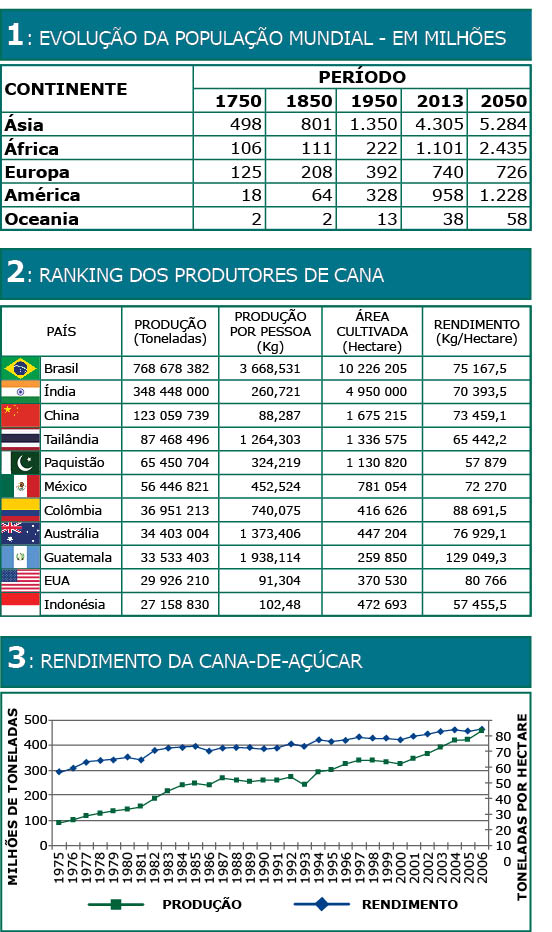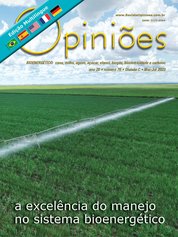Dario Costa Gaeta
VP Operações Agrícola e Industrial da Atvos Agroindustrial
OpAA76
Qual é a melhor tecnologia do mundo?
A agricultura no mundo inteiro avança rapidamente para atender os 2 bilhões de bocas adicionais dos próximos 30 anos, conforme demonstra o gráfico 1. Austrália desenvolve centros de tecnologia para reforçar o título de agricultura mais avançada no mundo. Holanda não faz tanta propaganda, mas consegue ser, com sua minúscula área, maior que o Brasil no Agronegócio. Suas empresas trabalham silenciosamente desenvolvendo tecnologias que nós nem sonhamos poder existir. O maior país do mundo em agricultura, a China, surpreende com seu gigantismo e organização, já que se sabe que boa parte destes 2 bilhões de bocas estarão em suas terras ou vizinhas a elas. Os Estados Unidos se seguram como podem após grande desenvolvimento de sementes, que trouxe um crescimento fantástico de sua produtividade e com seus satélites e equipamentos autônomos. Todos preocupam-se em garantir a segurança de alimentos que já é, em muitos países, prioridade estratégica.
 E o Brasil? O Brasil timidamente se posiciona entre os grandes como deveria. Detém a primeira posição no ranking de maior exportador em diversas culturas, inclusive é o maior produtor mundial de cana-de-açúcar, conforme demonstra o gráfico 2.
E o Brasil? O Brasil timidamente se posiciona entre os grandes como deveria. Detém a primeira posição no ranking de maior exportador em diversas culturas, inclusive é o maior produtor mundial de cana-de-açúcar, conforme demonstra o gráfico 2.
O Estado de São Paulo, sozinho, é maior que qualquer país produtor de cana-de açúcar individualmente, com exceção da Índia. Nos grãos, o Brasil obteve um crescimento fantástico de produtividade nos últimos dois decênios. Entre a década de 70 e 2020, a produtividade da soja cresceu 207%. No mesmo período, a cana não teve seu rendimento por hectare maior que 50%, conforme demonstra o gráfico 3.
E por que o Brasil é tímido em sua posição de liderança agrícola no mundo? Por que ele foca em commodity básica e não em produtos industrializados? Por que o grande fluxo de comércio está concentrado nas grandes Tradings globais, fora do controle dos produtores? Por que não possui tecnologia avançada (ainda) para fazer frente aos países com tecnologia nem vultosos investimentos em Pesquisa e Desenvolvimento? Realmente não importa.
No médio prazo, todas as tecnologias não monopolizadas estarão “democraticamente” acessíveis e disponíveis pelo mundo: drones de monitoramento, controles biológicos de pragas, equipamentos autônomos, controles automatizados de doenças e mato, agricultura de precisão e mais uma centena de novos microdesenvolvimentos que aportarão inteligência, economia de custo e mais produtividade ao campo. É fato que todas as tecnologias acima mencionadas e as demais que virão serão ferramentas vitais de competitividade para todas as culturas no Brasil: soja, laranja, café, milho e cana, para nomear algumas das mais importantes.
É fato também que o crescimento de produtividade por hectare na cana de “apenas” 50% em quase 30 anos estagnou há quase 20 anos. Portanto, estamos andando de lado, flutuando entre 70 e 80 toneladas por hectare de média no setor. Não quebramos essa barreira.
Há dois fatores determinantes que impactam fortemente na produtividade: qualidade do solo e São Pedro. Assumindo que ambos são “dados”, depois do plantio não temos nenhuma ingerência nesses fatores. Podemos sim, com irrigação e nutrição adequadas, melhorar um pouco a condição do solo, mas nada melhor que uma boa chuva na época certa em solo com condições edafoclimáticas tipo A.
Sendo assim, conforme o título deste artigo, qual a maior tecnologia do mundo que realmente fará a diferença para o Brasil fazer frente aos demais países e tirar o setor sucroenergético desta estagnação de quase 20 anos? A maior tecnologia é a mais desafiadora, não somente no Brasil, como no mundo inteiro.
Alguns países evoluíram um pouco contornando esta tecnologia, pois as condições em seus locais eram praticamente proibitivas do ponto de vista de custo. O grande fator que sempre fez a diferença e vai ser o único diferencial do nosso setor para sustentar o sucesso de produtividade crescente é o nosso homem do campo. Com tecnologias disponíveis e acessíveis para todos, a nossa gente do campo é que vai virar o jogo e fazer a grande diferença.
Não existem barreiras para uma frente de plantio, tratos culturais ou colheita engajada e motivada. Como todo time de sucesso, o líder é vital para avaliar e acompanhar a dinâmica e executar modificações quando for necessário. Pode parecer óbvio e lugar comum o que estou afirmando, mas aprendi nas 18 safras que vivi que o óbvio no setor sucroenergético não é óbvio. Já vi um time que alcançava resultados pífios, com muitos conflitos, alta rotação de pessoas que, com o líder certo, mudou drasticamente o comportamento e seus resultados.
Óbvio? Acredito que se o fosse, esse time não tinha chegado ao ponto que chegou com resultados medíocres. Um líder não necessariamente garante um time vencedor; e pode ser a causa de um time que não traz resultado. Posso afirmar que a maioria dos homens do campo quer fazer o certo, tem sede de aprender mais e sofrem quando algo fora de seu alcance dá errado ou pior, devido a uma ordem para executar algo que não é tecnicamente correto.
A Atvos está numa jornada ascendente de produtividade, saindo de 22 milhões de toneladas para chegar perto dos 30 milhões de toneladas por ano na próxima safra. Esse mérito é totalmente do homem do campo e de suas lideranças, formando um time agrícola engajado e poderosamente capaz de desafiar adversidades e superar dificuldades. Saímos de 42 toneladas por hectare e vamos atingir o dobro, 85 toneladas em 3 anos.
Todas as tecnologias modernas estão disponíveis. Todas as técnicas agronômicas são acessíveis para todos. Mas um homem da frente de batalha com vontade de fazer acontecer é muito mais potente e importante para garantir os melhores resultados possíveis. Propósito com gestão ainda é a melhor saída.




